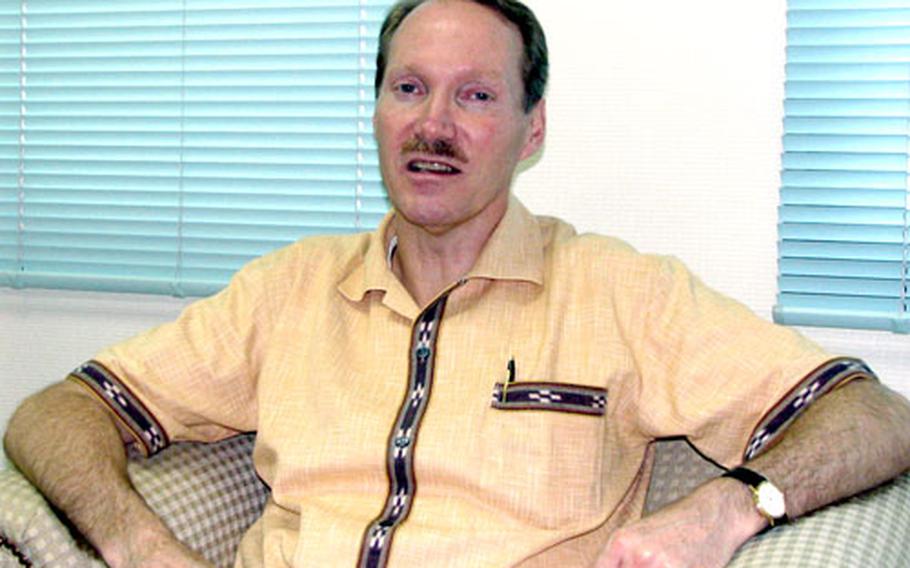
Kevin Maher, the new U.S. consul general to Okinawa, is no stranger to the thorny issue of the large U.S. base footprint on Okinawa. (David Allen / Stars and Stripes)
URASOE, Okinawa — The new U.S. consul general to Okinawa already is on a first-name basis with the thorny issue of the island’s large U.S. base footprint.
He’s spent the past year developing the plan to move Marine air operations to rural northeast Okinawa, transfer more than half of the Marines to Guam and return base property in the island’s urban south.
Kevin Maher, 52 — who arrived on Okinawa on Thursday for three years as head of its U.S. Consulate — was in charge of U.S. force-realignment issues in Japan as political-military affairs director at the U.S. Embassy in Tokyo.
Maher said he’s pleased to be able to help implement those parts of the realignment plan affecting Okinawa. “We’ve got a good agreement,” he said during an interview at the consulate on Friday.
Realignment had two objectives, he said: improving the U.S.-Japanese alliance’s deterrent capability while reducing U.S. bases’ impact on local communities.
On Okinawa, that meant drafting a new plan to close Marine Corps Air Station Futenma in urban Ginowan. The plan calls for building a two-runway facility on Camp Schwab’s lower part and reclaimed land in Oura Bay.
Some 8,000 Marines then would move to Guam, giving up Futenma, most of the Naha Military Port and Camp Kinser, all of Camp Lester and part of Camp Foster. It’s all to be done by 2014.
Environmental assessments will “be a two- or three-year process … because we’re going to do landfill work,” Maher said, adding that some on-land construction might start as soon as 2007.
Of Okinawans protesting the plan, he said, “We anticipated there would be some adverse reaction. We’re confident that we have reached … a package that really is very good for Okinawa in terms of reducing the burden of the base presence.”
He stressed that the Camp Schwab plan was the key to moving Marines to Guam and closing the southern bases, saying, “If we can’t implement the Futenma replacement facility, we have no choice but to stay where we are.”
As Maher arrived on Okinawa, angry protesters in Naha were confronting a top Japanese defense official who’d just confirmed that Patriot interceptor missiles and 600 U.S. soldiers soon would be deployed to Kadena.
Maher contended that North Korea’s missiles test launches earlier this month proved Okinawa easily could be a target. “If people thought cautiously and seriously, they’d understand that there is a real missile threat and having the capability to counter that threat is … very important,” he said. “PAC-3 is a very valuable asset and Kadena is a very important base.”
He said putting the Patriot Advanced Capability-3 missiles on U.S. and Japanese bases had been discussed for some time and was not “a direct reaction to the North Korean missile launches” but the launches “illustrate that there is a missile threat out there that’s very real.”
He dismissed opponents’ claims that the missiles would boost the so-called “base burden” on local communities, saying, “It’s a kind of a system that has no impact on people’s daily lives. It’s quiet and we’re not going to be launching missiles to train out of Kadena. It has no environmental impact … no noise impact."
Maher predicted that “a large portion of my time will be spent on military issues. … One of my most important jobs is going to be doing whatever I can to contribute to ensuring that the agreement on realignment, with respect to the Okinawa portion, stays on track.”